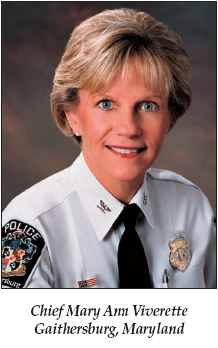 In the 113 years since its founding, the International Association of Chiefs of Police has continually strived to fulfill the vision of its founders, who came together out of the realization that protecting their communities from crime and violence required that they work together, share information, and communicate with one another.
In the 113 years since its founding, the International Association of Chiefs of Police has continually strived to fulfill the vision of its founders, who came together out of the realization that protecting their communities from crime and violence required that they work together, share information, and communicate with one another.
Remarkably, the vision set forth over a century ago remains relevant today. Many of the concerns that brought our predecessors together in 1893 still confront us in 2006. Yet, while much has remained the same, we as police chiefs in the 21st century find ourselves confronting individuals who perpetrated crimes and acts of horror that were unthinkable in the 19th century.
The accelerating and unprecedented challenges faced by 21st-century police executives are not exclusive to one nation or one region of the world. To be successful in fighting the global menace of crime and terror we must look beyond our borders and work in cooperation with our colleagues around the world.
It is for this reason that the I in IACP has never been more important and it is the IACP that we look to for the leadership, the guidance, and the forum to accomplish our latest mission and defeat this terrible foe. IACP is leading the way for law enforcement leaders around the world as we proactively seek out opportunities to integrate and coordinate our efforts—locally, nationally, and internationally—to create a truly united front in the fight against crime and terrorism.
It is because of the central role that IACP plays in fostering these critical relationships that I am so pleased with the continuing growth and strength of IACP’s international program. Led by International Vice President Tom Driessen, the IACP Division of International Policing continues to grow, now representing IACP members in 103 countries worldwide.
IACP has recently appointed two world regional office chairs. General Saad Jassim Al-Khulaifi of the Qatar Police Force will host the IACP World Regional Office for the Middle East and North Africa, and Commissioner Paul Farquharson of the Royal Bahamas Police will host the IACP World Regional Office for the Carribbean and Central America.
The establishment of the Middle East World Regional Office is especially significant because it means that the IACP now has a meaningful presence in all seven of the IACP’s world regions. The office in Doha, Qatar, joins our offices in Toronto, Canada; Nassau, Bahamas; Brasilia, Brazil; Dublin, Ireland; New Dehli, India; and Durban, South Africa.
In addition, to maintaining its world regional offices, the IACP continues to provide police executives around the world with the opportunity to come together and learn from one another at various regional training conferences: Already this year, the IACP hosted the Second IACP Sub-Saharan Executive Policing Conference in Durban, South Africa, and the 23rd IACP European Executive Policing Conference in Sofia, Bulgaria.
This month, the IACP South American Executive Public Safety Seminar will be held in Fortaleza, capital of the state of Ceara, Brazil. This event will build upon the success of the past five IACP regional conferences and provide a unique forum for the discussion of critical public safety issues by senior law enforcement officials in the region.
The IACP has also continued to raise its international profile by sending delegations to international policing conference such as the annual conference of the British Association of Chief Police Officers and the Association of Caribbean Commissioners of Police as well conducting visits with the Taiwanese National Police. Through exchanges of this nature, the IACP hopes to establish and foster cooperative relationships with other law enforcement associations and agencies throughout the world.
In fact, in order to promote these relationships IACP has restructured its international division to include chief executive officer representation from various national and transnational organizations such as the Association of Caribbean Commissioners of Police, the Southern African Regional Police Chief Council Organization, the European Network of Police Women, the Association of Chiefs of Police (United Kingdom), the French National Police Association, the Superintendents Association of Northern Ireland, and the Organization for Security and Cooperation in Europe.
The strength of the IACP’s international program is a reflection of the leading role that the IACP has played, and must continue to play, in bringing the world’s law enforcement agencies together as we strive to combat our common foes and protect our communities from harm.
The strength of the international program is also a validation of the vision and the wisdom of the IACP’s founders who realized that only by working together locally, nationally, and internationally can we hope to prevail.


